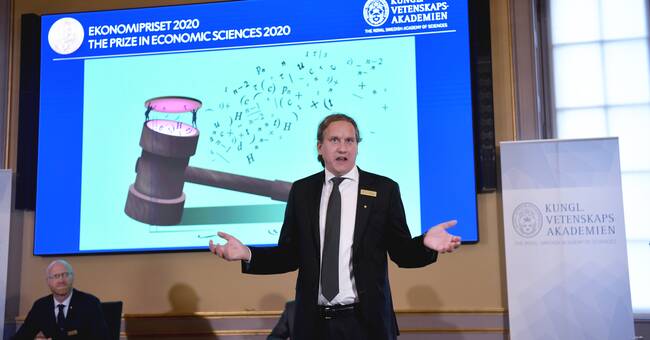The older of the two prize winners, Robert Wilson, already 40 years ago became interested in auctions.
He developed a theory that explains how auctions of items that have the same value for everyone, but uncertain value at the moment, work.
Paul Milgrom, the younger - who, however, has also crossed the 70 mark - was a doctoral student of Robert Wilson.
He took the research further and developed a general auction theory.
With it, you can analyze auctions of items that simultaneously have a common value and different value for different bidders.
According to the prize committee, this happened from the beginning without thinking that the theories would be put into practice.
License auction
But the two economists began to use their theories to design new auction formats.
In the United States, authorities began auctioning mobile licenses in the 1990s instead of giving them away.
It spread to more parts of the world, not least Europe.
The general public began to use theories to procure welfare services, ranging from garbage collection to elderly care.
Trade in carbon dioxide emission rights has also been based on the theories of the two prize winners.
Now that Minister of Finance Magdalena Andersson is to save Sweden from the corona crisis with a crisis package for hundreds of billions, the government bonds that finance it all are being auctioned off.
Auction theories are also increasingly used in other parts of the financial market.
It has become possible thanks to more and more computing power.
Search results are sold
Google is auctioning off search results on the internet.
The one who pays the most comes at the top of the hit list.
If you need a physiotherapist, or dishwasher, or whatever else, you get search results based on auctions designed using Milgrom's and Wilson's theories.
The more of our consumption, our decisions, and our lives that move out on the internet, the more will be determined by what someone has paid in an auction.
The auction theories have made it easier to set the right price in more and more contexts.
But the result of an auction will not always be good for all parties.
When it comes to care and nursing, for example, it can be difficult to measure and value quality in all the ways you would need for the auction to be successful.
What is described as a success story, the mobile licenses, has admittedly brought in $ 200 billion globally to the general public.
But the bidding also led to telecom operators paying more than they could handle, getting into debt and crashing.
Telekomfest
In Sweden, we noticed perhaps most that Ericsson, which built the mobile networks for the telecom party, almost collapsed and had to be saved by shareholders with SEK 30 billion.
Now it's time for a new round of mobile licenses.
It's about the 5G network.
The fears are many, including when it comes to coverage nationally.
But Milgrom and other auction theorists, together with computer scientists, mathematicians and behavioral scientists, have refined the methods, and created completely new auction formats as they are called.
And once the licenses are awarded and the 5G network is up and running, it's no daring guess that our use of it will lead to even more digital auctions, in even more areas.

